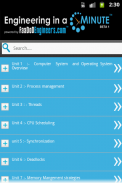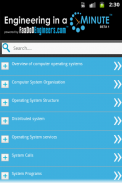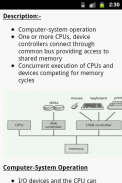






Basics of Operating Systems

Opis Basics of Operating Systems
Welcome to an exciting world of operating systems (O/S)
Usually a part of computer science, software engineering, programming and information technology courses but open for all enthusiasts to learn the basics.
The App covers more than 125 topics on the subject divided into 14 units.
The App brings all the interesting topics in a flashcard which is easy to browse, revise and come back to another topic to learn. Some of topics Covered in this application are:
1. Overview of computer operating systems
2. Computer System Organization
3. Operating System Structure
4. Distributed system
5. Operating System services
6. System Calls
7. System Programs
8. Operating System Generation
9. Operating-System Services
10. Operating-System Interface
11. Process Management
12. Process Control Block
13. Schedulers
14. Context switch
15. Operations on Processes
16. Interprocess Communication
17. Sockets
18. Remote Procedure Calls
19. Remote method invocation
20. Threads
21. Scheduling Criteria
22. Scheduling Algorithms
23. Multithreading Models
24. Thread Libraries
25. Threading Issues
26. CPU scheduling
27. Multiple-Processor Scheduling
28. Symmetric Multithreading
29. Thread Scheduling
30. Solaris Scheduling
31. Windows XP Scheduling
32. Linux Scheduling
33. Algorithm Evaluation
34. Process Synchronization
35. The Critical Section Problem
36. Synchronization Hardware
37. Semaphores
38. Classic problems of synchronization
39. Monitors
40. Atomic Transactions
41. Deadlocks
42. Deadlock Characterization
43. Methods for handling deadlocks
44. Deadlock Prevention
45. Deadlock Avoidance
46. Banker’s algorithm
47. Deadlock Detection
48. Recovery from Deadlock
49. Memory Management Strategies
50. Address Binding
51. Logical versus Physical Address Space
52. Dynamic Linking and Loading
53. Swapping
54. Contiguous Memory Allocation
55. Fragmentation
56. Paging
57. Hardware Support in paging
58. Shared Pages
59. Segmentation
60. Virtual memory
61. System libraries
62. Demand Paging
63. Copy-on-Write
64. Page Replacement
65. FIFO Page Replacement
66. Optimal Page Replacement
67. LRU Page Replacement
68. Enhanced Second-Chance Algorithm
69. Allocation of Frames
70. Thrashing
71. Working-Set Model
72. Page-Fault Frequency
73. Memory-Mapped Files
74. Shared Memory in the Win32 API
75. Allocating Kernel Memory
76. Slab Allocation
77. File Concept
78. File Operations
79. File Types
80. Directory Structure
81. Directory
82. File System Mounting
83. File System Structure
84. File System Implementation
85. Directory Implementation
86. Free Space Management
87. Recovery
88. Log-Structured File Systems
89. Network file systems
90. Network file systems protocol
91. Magnetic Disks
92. Disk Structure
93. Disk Attachment
94. Disk Scheduling
95. Disk Management
96. Boot Block
97. Bad Blocks
98. Swap-Space Management
99. I/O Systems
100. Polling
101. Direct Memory Access
102. Application I/O Interface
103. Kernel I/O Subsystem
104. Transforming I/O Requests to Hardware Operations
105. Streams
106. Performance
107. Protection
108. Access Matrix
109. Implementation of Access Matrix
110. Access Control
111. Language-Based Protection
112. The Security Problem
113. Malicious codes
114. System and Network Threats
115. Cryptography as a Security Tool
116. Authentication
117. Key Distribution
118. User Authentication
119. Firewalling to Protect Systems and Networks
120. Distributed System Structures
121. Types of Distributed Operating Systems
122. Distributed Operating Systems
123. Network Structure
124. Network Topology
125. Communication Protocols
126. Robustness
Wishing you a very happy learning

























